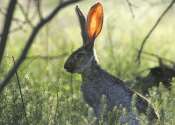Study offers new insights into the timeline of mammal evolution
A new study, published today in the journal Nature, has provided the most detailed timeline of mammal evolution to date.

A new study, published today in the journal Nature, has provided the most detailed timeline of mammal evolution to date.
Evolution
Dec 22, 2021
0
681

For decades, scientists have hotly debated the origin of the western honey bee. Now, new research led by York University has discovered these popular honey-producing bees most likely originated in Asia.
Evolution
Dec 3, 2021
0
424

There are extinctions, and then there's the "Great Dying." That was the Permian-Triassic extinction around 250 million years ago, which wiped out nearly all life on Earth.
Evolution
Dec 2, 2021
0
1599

The oldest unequivocal evidence of upright walking in the human lineage are footprints discovered at Laetoli, Tanzania in 1978, by paleontologist Mary Leakey and her team. The bipedal trackways date to 3.7 million years ago. ...
Evolution
Dec 1, 2021
0
2196

From 50,000 years to 6,000 years ago, many of the world's largest animals, including such iconic grassland grazers as the woolly mammoth, giant bison, and ancient horses, went extinct. The loss of these grazing species triggered ...
Evolution
Nov 25, 2021
4
1227

Just about everyone knows that exercise is good for you. Some people can even rattle off reasons it keeps your muscles and joints strong, and how it fights off certain diseases. But how many people can tell you the story ...
Plants & Animals
Nov 22, 2021
0
3435

New research by a team of University of Florida investigators, and others, provides evidence that host immunity drives evolution of the dengue virus. The work, published today in Science, retrospectively analyzes two decades ...
Evolution
Nov 18, 2021
0
192

Which genes control the defining features that make us look as we do? And how do they make it happen?
Evolution
Nov 10, 2021
0
202

A wide variety of animals have tusks, from elephants and walruses to five-pound, guinea pig-looking critters called hyraxes. But one thing tusked animals have in common is that they're all mammals—there are no known fish, ...
Evolution
Oct 26, 2021
1
450

Whether chatting with friends at a dinner party or managing a high-stakes meeting at work, communicating with others in a group requires a complex set of mental tasks. Our brains must track who is speaking and what is being ...
Plants & Animals
Oct 21, 2021
0
190